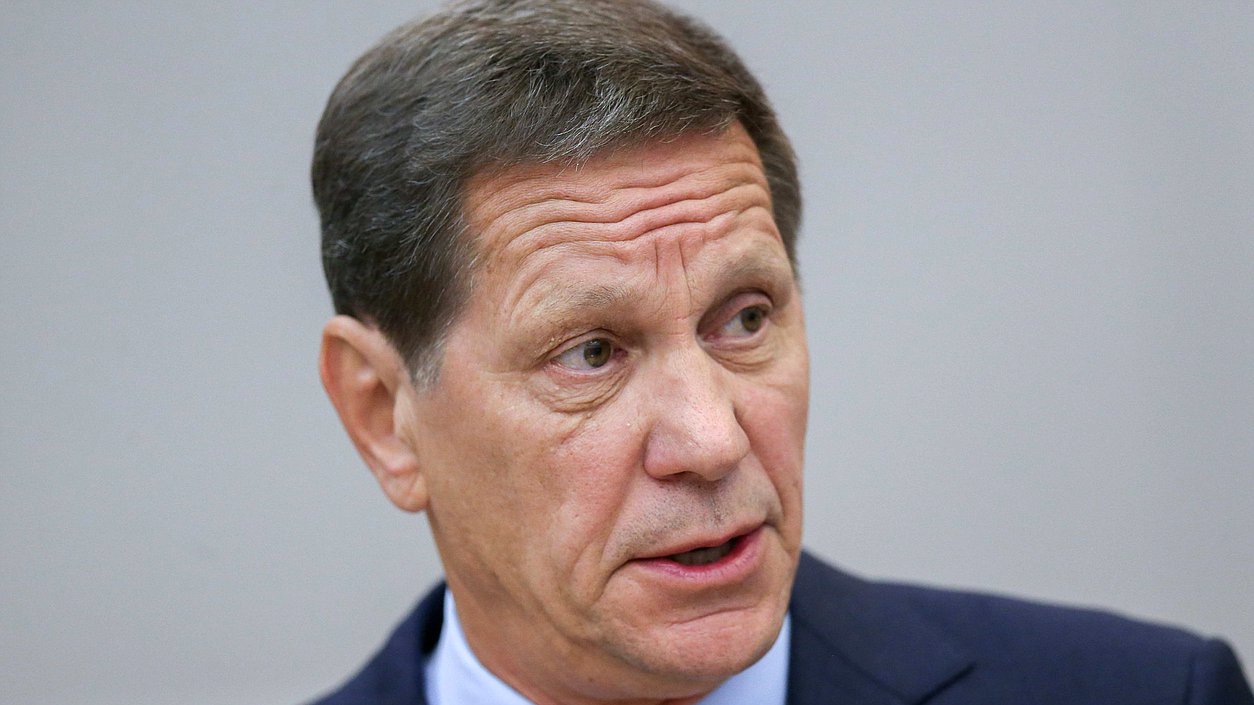
First Deputy Chairman of the State Duma Aleksandr Zhukov

Alexander Dmitrievich
also held negotiations with Bundestag Vice-President Thomas Opperman.
Following the meetings, Aleksandr Zhukov informed that the parliamentarians exchanged views on a very wide range of issues: “Firstly, I must say that our German colleagues strongly support the reinstatement of the rights of Russian parliamentarians in the Parliamentary Assembly of the Council of Europe. German colleagues believe that without Russia, work of the Parliamentary Assembly is not so effective; in general, it loses its meaning”.
The parties agreed to meet not only at the level of “friendship groups” but once a year to conduct meetings at the level of the leadership of parliaments.
“I conveyed an invitation from the Chairman of the State Duma to President of the Bundestag Mr. Schäuble to visit Russia. In his turn, Mr. Opperman invited our delegation on a return visit next year. Maybe even a football rematch will take place,” said Aleksandr Zhukov.
He said that “within the framework of the “friendship group” commissions that will work in various areas will be created and there will be close contact between our profile committees, such as the Committee on International Affairs, Budget and Taxes, Energy Committees and others.”
In addition, parliamentarians exchanged views on the development of economic cooperation. “We agreed that such an important project as Nord Stream-2 should be realized. Our German colleagues expressed their firm conviction that this project will be mutually beneficial for both Russia and Germany. Despite the well-known US political pressure, this project should be realized,” said Aleksandr Zhukov.
“Despite the sanctions, many ties have been established between the Russian and German regions, new sister towns have appeared this year. Despite sanctions, economic ties between our countries have been developing very actively in the last two years. Trade turnover in 2017 increased by 25%, and this year it is likely to grow by 30%. This suggests that large German business is interested in cooperation with Russia and, perhaps, no one is interested in having any new economic sanctions,” said Aleksandr Zhukov.
“The general opinion is that sanctions damage both Russia and Germany,” he said.
“Since about 5,000 German enterprises are somehow connected with the Russian economy, several hundred thousand workers in Germany are involved in economic cooperation with Russia, and no one wants to lose these jobs,” he said.
Aleksandr Zhukov also added that the next year will be a very important year in relations between the two countries as this is the year of Russian culture in Germany.
Dirk Wiese outlined a number of topics on which the intensification of constructive dialogue is possible. First of all, this is interregional cooperation and the development of relations between sister towns and universities, interaction between the institutions of civil society.
Ambassador Extraordinary and Plenipotentiary of Russia to Germany Sergey Nechaev drew the attention of the meeting participants to the development of a new form of economic strategic partnership, special investment contracts. The mechanism introduced in the framework of the in-depth localization of foreign production in Russia gives German companies, which already use it, considerable advantages.
Chairman of the Committee on Energy Pavel Zavalnyi

Pavel Nikolaevich
drew the attention of the German side to the opportunities, which are opening up for German engineering companies, with soon implementation of a large-scale program for the modernization of power generation in Russia.
Today a delegation of State Duma that consists of members of the group on inter-parliamentary relations with Germany, met representatives of the German Bundestag Committee on International Affairs headed by its chairman Norbert Rättgen. The situation in PACE and the prospects for Russia’s withdrawal from this organization were discussed during negotiations.
Norbert Rättgen, who represents the ruling party, CDU, and is known for its harsh position in relation to Russia, directly linked the topic of PACE with the situation in Crimea and Ukraine. However, other members of the committee representing the other parties, the SPD, the Left Party, the ”Green“ Party and the ”Alternative for Germany“ party (ADG), believe that, even keeping the most rigid position on this topic, it is wrong to refuse to cooperate with Russia in the framework of international organizations and unions, whether it is PACE or G8.
The representative of the Left Party, Stefan Liebig, openly declared that the European world order is impossible without Russia's participation.
His colleagues on the committee drew the attention of the meeting participants that today there is a fight inside PACE for certain amendments in the regulations that would make the actions that were taken in relation to Russia impossible. These amendments would turn PACE into a platform for full-fledged dialogue, which is determined by participants, not the international bureaucracy.
The representative of the ADG Peter Biström expressed confidence that the escalation of relations with Russia is not beneficial for Germany, and suggested the parliamentarians of both countries to make every effort to relieve this tension at the European level.
In his turn, Dirk Wiese stated that the position of the German leadership, which was recently declared in PACE, is the necessity to preserve Russia's membership in this organization and to make appropriate amendments to the regulation.
